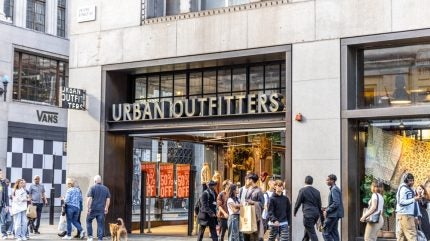
UK retail sales grew modestly in October 2025 as shoppers held back on spending ahead of the Black Friday discount period, new figures show.
According to the latest British Retail Consortium (BRC) and KPMG report, total retail sales rose by 1.6 % compared with the same month last year—up from 0.6 % in October 2024, but still below the 12-month average of 2.1 %.

Discover B2B Marketing That Performs
Combine business intelligence and editorial excellence to reach engaged professionals across 36 leading media platforms.
Many households appear to be waiting for deeper discounts before making larger purchases, while the upcoming UK Autumn Budget is also weighing on consumer confidence.
Food sales steady but non-food demand weak
Food sales continued to perform steadily, increasing by 3.5 % year-on-year—matching the 12-month average growth rate.
However, non-food sales grew by just 0.1 %, showing little improvement from last year’s decline of 1.1 %. In-store non-food purchases were also up only 0.1 %, while online non-food sales were flat.
Helen Dickinson, chief executive of the BRC, said October had been “a subdued month, with the weakest growth since May”. She explained that “many delayed spending, waiting for Black Friday deals and cooler temperatures before buying toys, electronics and clothing”.

US Tariffs are shifting - will you react or anticipate?
Don’t let policy changes catch you off guard. Stay proactive with real-time data and expert analysis.
By GlobalDataCertain categories, such as furniture and homeware, performed slightly better as families began preparing for festive gatherings. However, Dickinson noted that “food sales also saw good growth, but this was mostly driven by higher prices rather than higher volumes”.
Consumers cautious ahead of budget decisions
The BRC warned that continued uncertainty over business rates and wider economic conditions could undermine retail recovery. “Retailers are counting on Black Friday to deliver a vital boost, but looming Budget decisions risk undermining fragile consumer confidence,” Dickinson said.
She cautioned that “a business rates surtax on retail would put major stores and thousands of jobs at risk”, urging the government to “remove this threat and help curb inflation for businesses and families”.
Linda Ellett, head of consumer, retail and leisure at KPMG, said online sales growth had “dried up altogether”, while many home-related categories had fallen back in October.
She added that the coming months will show whether this reflects “the flattening out of the housing market, or a cautious consumer concerned about the UK’s economic prospects”.
Ellett noted that retailers were already rolling out early Black Friday discounts in an effort to “swiftly reverse the slowdown in sales growth seen during October”.
Festive outlook depends on black Friday boost
With Black Friday campaigns already underway and Christmas displays filling stores, retailers are hoping for a strong end to the year.
KPMG’s research suggests that most shoppers plan to make purchases during the Black Friday period, and that artificial intelligence is beginning to influence how consumers search for deals and gifts online.
Meanwhile, food retailers say shoppers are being more selective in their grocery spending. Sarah Bradbury, chief executive of IGD, said that “shopper focus has shifted towards controlling their spending more tightly this month for food and grocery shopping”.
She added that confidence has dipped, with people “prioritising saving money over quality for the first time this year”.
Bradbury said many households remain cautious despite easing food price inflation. “With the job market stalling and the gap between pay growth and price rises narrowing, shoppers aren’t feeling much benefit,” she explained.
She predicted that people “will be extra cautious in the short term to ensure they can afford to treat themselves at Christmas”.
Analysts say the overall outlook for the UK retail sector depends heavily on whether consumer spending rebounds during Black Friday and the festive season.
For now, many households appear to be holding their wallets closed—waiting for the right deal before making their move.



